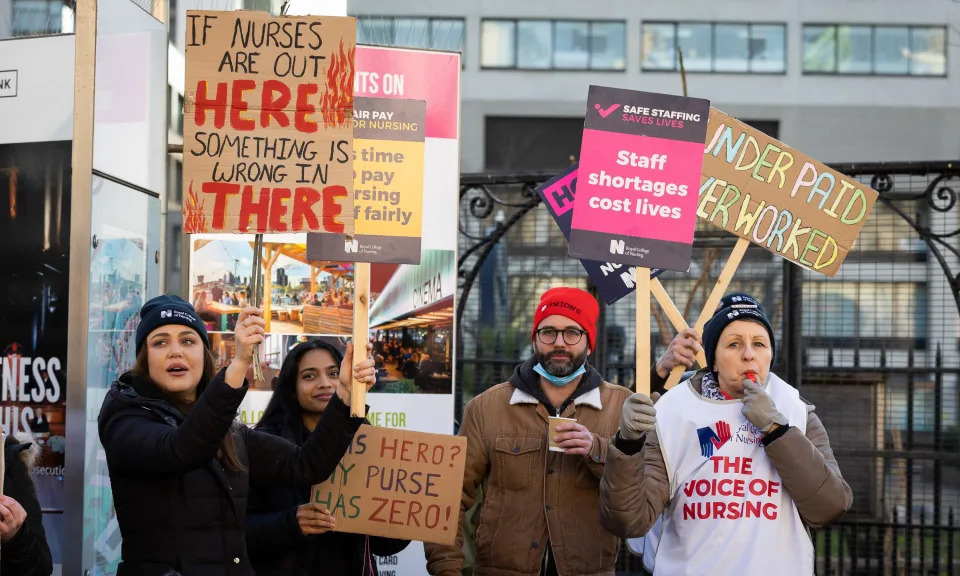Jessica Elgot, Denis Campbell, Heather Stewart, Pippa Crerar and Richard Adams
Wed, 22 February 2023

Ministers have been given the freedom to talk to unions about pay settlements that could include backdated or one-off payments as ways to end the escalating series of public sector strikes.
But Downing Street said it was critical unions agreed to call off planned industrial action before talks could begin, as the Royal College of Nursing (RCN) did on Tuesday.
It is understood that the Cabinet Office has given guidance to secretaries of state about the new parameters within which they can negotiate. They underline the expectation that new efficiency reforms will be announced in return for pay deals and the pre-condition that planned strike action must be cancelled for intensive negotiations to commence.
However, the Treasury has said any pay increases above the 3.5% maximum planned for 2023-24 must be funded from existing budgets, which could force departments to find billions in savings.
For example, if NHS staff do receive a 5% uplift next year, the Department of Health and Social Care (DHSC) and NHS England could have to find about £1.8bn from their budgets to bridge the gap between that amount and the 3.5% the government said on Tuesday was all it could afford.
“It is up to secretaries of state how that works in practice,” one Whitehall source said. “But categorically, pay awards will be from existing departmental budgets. That has not changed.” Asked if that restriction came with potential cost for tackling the NHS backlog, the source said it was important that broader efficiencies were part of the final package.
The health secretary, Steve Barclay, is understood to be prepared to discuss backdating next year’s pay settlement, which would be a way of meeting the red line for all 12 health unions that pay for this year must be on the table – without reopening the full settlement.
A DHSC source rejected the GMB union’s claim that Barclay is trying to “divide and rule” the health unions by holding “intensive” pay talks with only the RCN. The source stressed that the RCN had shown “huge amount of goodwill” in backchannels and conversations with officials, and that calling off planned action was crucial to entering the intensive talks.
Barclay and RCN officials on Wednesday began discussing a number of options for improving nurses’ pay both this year and in 2023-24. They are thought to include both consolidated and also non-consolidated pay rises, a strategy which the Labour government in Wales is using as part of its efforts to reach a settlement with NHS unions there.
As well as pay, the talks will examine ways to lift administrative burdens on nurses and ways to reduce agency costs, as well as non-pay issues raised by unions including flexible working. Talks are expected to be ongoing over the coming days.
No 10 has made it a red line that the intensive phase of talks can only begin when strike action is called off.
“Strike action is very disruptive and there needs to be a lot of focus from all departments on contingency planning if they’re going ahead, which means it makes it more difficult to have these sort of detailed negotiations. It means being in a good constructive place,” one official said.
However, the National Education Union has said it will not pause planned industrial action next week until it has a clear indication of what is on offer from the government. Downing Street said the offer of talks would only stand once that had been called off.
“We’re obviously disappointed given I think the NEU and many other unions have wanted to talk about pay and have wanted to have these discussions for some time,” Rishi Sunak’s official spokesperson said. “The discussions and the talks are on the basis that they do stop strike action – there will be no talks, obviously, if they do not take that step.”
Leaders of teaching unions including the NEU say the education secretary, Gillian Keegan, has failed to offer any movement on pay, with several characterising the talks to date as “polite discussions”, and one describing them as “meandering”.
Paul Whiteman, the general secretary of the National Association of Head Teachers, said Keegan was making matters worse by insisting that strikes first be ruled out, adding: “After a series of meaningless encounters, the secretary of state holds out a public olive branch with thorns attached that make it impossible to grab.”
The NEU’s leaders said the union’s executive could call off next week’s regional strikes in England if the government makes a “serious proposal” by Saturday. “As things stand, however, no such offer has been made and the strikes remain in place,” the union said.
Sunak himself is understood to be taking a keen interest in the detail of the reforms that are possible, particularly in the NHS, which can free up frontline health workers from bureaucratic burdens.
“He is getting into the detail, he wants to fix those problems,” one senior official said. “Over the spring we want to see these issues being worked through and fixed. I think there is a realisation that we must demonstrate he is a prime minister fixing problems and improving long-term issues. Then we get breathing space to talk about long-term ambitions.”
No comments:
Post a Comment